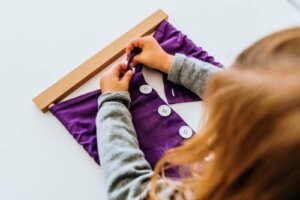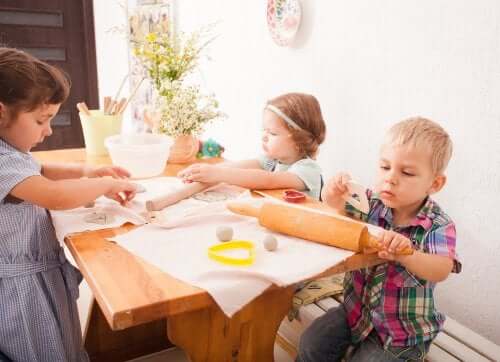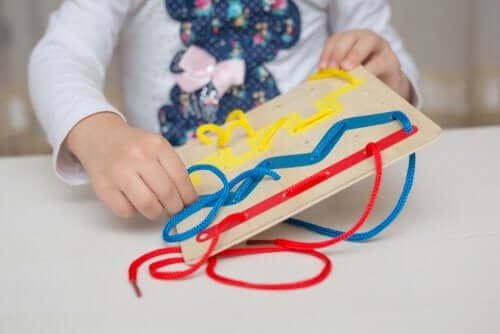5 Maria Montessori Quotes About Children's Education


Written and verified by the psychologist Ana Couñago
You probably know about Maria Montessori, who was an Italian doctor and educator. She revolutionized education at the beginning of the 20th century by creating her own educational method. That’s why we’d like to highlight several inspiring Maria Montessori quotes in this article.
Montessori’s idea of children’s education is that we should guide them in order to help them develop all their physical and intellectual potential, while they interact with their environment.
Maria Montessori: 3 pillars of her method
Three pillars make up the foundation of the Montessori method:
- Active discipline: children are the main characters of their own learning process. So, their role needs to be active and dynamic. This requires certain discipline, because children need to be responsible and independent to self-direct themselves.
- Adults as guides: adults have to guide and orient children through their learning process. To do this, they need to help them when necessary and intervene only when it’s essential.
- Prepared environment: you need to create an environment prepared for the learning process, respecting the different stages of children’s development. In addition, the environment should be organized, relaxed, appealing and stimulating. Thus, children get to choose and explore, respecting an order.

Nevertheless, this educational method is much more than this. Next, we’ll show you some Maria Montessori quotes that sum up her principles and thoughts regarding children’s education.
5 Maria Montessori quotes about children’s education
1. “He does it with his hands, by experience, first in play and then through work. The hands are the instruments of man’s intelligence.”
In an environment adapted to their needs and which promotes exploration of the real world, children can have sensory experiences that will help them acquire basic skills for their future development.
2. “The secret to good teaching is to regard the child’s intelligence as a fertile field in which seeds may be sown, to grow under the heat of flaming imagination.”
We need to raise good people. Therefore, we need to share positive values with them, like mutual respect, empathy, understanding, dignity, etc.
Even though at first they may not comprehend these ideas, once they grow, they’ll understand their importance. And, they’ll put them into practice in a spontaneous, ethical and moral way.
3. “The exercise of practical life are formative activities, a work of adaptation to the environment. Such adaptation to the environment and efficient functioning therein is the very essence of a useful education.”
We need to raise children that can face life and life’s changes with success. To do this, we need to promote creativity, which includes fluency, flexibility and originality. All these characteristics are essential to adapt to different contexts and situations.

4. “Never help a child with a task at which he feels he can succeed.”
Children need independence to grow. If we give them everything on a silver platter, they’ll never learn to do things on their own. Therefore, adults should be just mediators. And, they shouldn’t interfere in the children’s opportunities to learn.”
5. “Children are human beings to whom respect is due, superior to us by reason of their innocence and of their greater possibilities of their future.”
Since children have an innate will to understand the world that surrounds them, we need to let them explore it. Therefore, by learning from their own experiences, they’ll become independent adults.
What do these Maria Montessori quotes teach us?
Through her quotes, Maria Montessori teaches us the importance of freedom and discipline in the learning process. These two elements are necessary to raise children that become:
- Independent and autonomous.
- Responsible.
- Confident.
As a result, we’ll be raising children that can become functioning adults.
You probably know about Maria Montessori, who was an Italian doctor and educator. She revolutionized education at the beginning of the 20th century by creating her own educational method. That’s why we’d like to highlight several inspiring Maria Montessori quotes in this article.
Montessori’s idea of children’s education is that we should guide them in order to help them develop all their physical and intellectual potential, while they interact with their environment.
Maria Montessori: 3 pillars of her method
Three pillars make up the foundation of the Montessori method:
- Active discipline: children are the main characters of their own learning process. So, their role needs to be active and dynamic. This requires certain discipline, because children need to be responsible and independent to self-direct themselves.
- Adults as guides: adults have to guide and orient children through their learning process. To do this, they need to help them when necessary and intervene only when it’s essential.
- Prepared environment: you need to create an environment prepared for the learning process, respecting the different stages of children’s development. In addition, the environment should be organized, relaxed, appealing and stimulating. Thus, children get to choose and explore, respecting an order.

Nevertheless, this educational method is much more than this. Next, we’ll show you some Maria Montessori quotes that sum up her principles and thoughts regarding children’s education.
5 Maria Montessori quotes about children’s education
1. “He does it with his hands, by experience, first in play and then through work. The hands are the instruments of man’s intelligence.”
In an environment adapted to their needs and which promotes exploration of the real world, children can have sensory experiences that will help them acquire basic skills for their future development.
2. “The secret to good teaching is to regard the child’s intelligence as a fertile field in which seeds may be sown, to grow under the heat of flaming imagination.”
We need to raise good people. Therefore, we need to share positive values with them, like mutual respect, empathy, understanding, dignity, etc.
Even though at first they may not comprehend these ideas, once they grow, they’ll understand their importance. And, they’ll put them into practice in a spontaneous, ethical and moral way.
3. “The exercise of practical life are formative activities, a work of adaptation to the environment. Such adaptation to the environment and efficient functioning therein is the very essence of a useful education.”
We need to raise children that can face life and life’s changes with success. To do this, we need to promote creativity, which includes fluency, flexibility and originality. All these characteristics are essential to adapt to different contexts and situations.

4. “Never help a child with a task at which he feels he can succeed.”
Children need independence to grow. If we give them everything on a silver platter, they’ll never learn to do things on their own. Therefore, adults should be just mediators. And, they shouldn’t interfere in the children’s opportunities to learn.”
5. “Children are human beings to whom respect is due, superior to us by reason of their innocence and of their greater possibilities of their future.”
Since children have an innate will to understand the world that surrounds them, we need to let them explore it. Therefore, by learning from their own experiences, they’ll become independent adults.
What do these Maria Montessori quotes teach us?
Through her quotes, Maria Montessori teaches us the importance of freedom and discipline in the learning process. These two elements are necessary to raise children that become:
- Independent and autonomous.
- Responsible.
- Confident.
As a result, we’ll be raising children that can become functioning adults.
All cited sources were thoroughly reviewed by our team to ensure their quality, reliability, currency, and validity. The bibliography of this article was considered reliable and of academic or scientific accuracy.
- Santerini, M. (2013). Grandes de la educación: María Montessori. Padres y Maestros/Journal of Parents and Teachers, (349).
- Velasco, R. (2010). Método Montessori. Temas para la Educación: revista digital para profesionales de la enseñanza, (6).
This text is provided for informational purposes only and does not replace consultation with a professional. If in doubt, consult your specialist.








